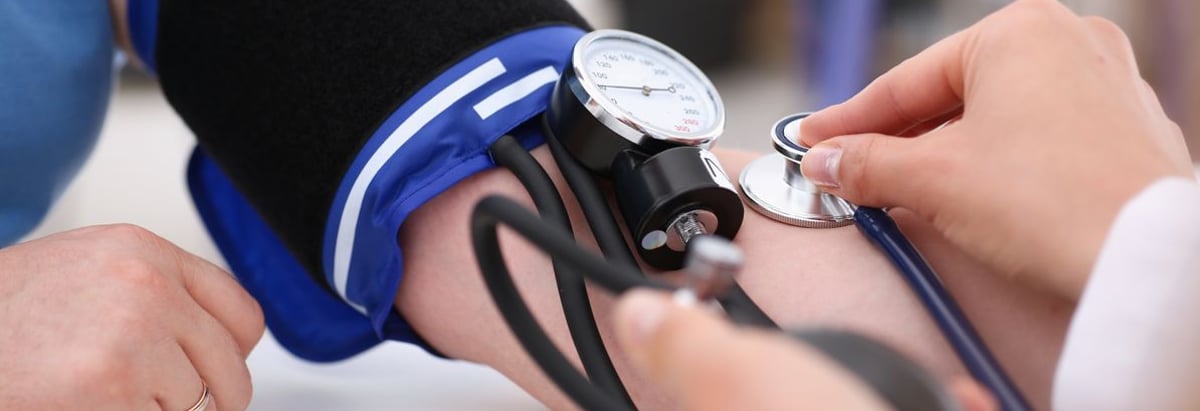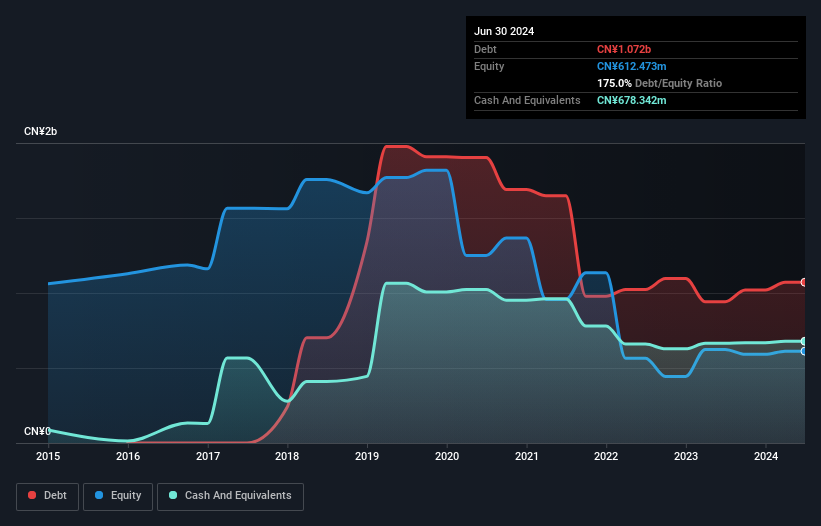- Hong Kong
- /
- Healthcare Services
- /
- SEHK:3869
We Think Hospital Corporation of China (HKG:3869) Can Stay On Top Of Its Debt

Warren Buffett famously said, 'Volatility is far from synonymous with risk.' So it seems the smart money knows that debt - which is usually involved in bankruptcies - is a very important factor, when you assess how risky a company is. Importantly, Hospital Corporation of China Limited (HKG:3869) does carry debt. But the more important question is: how much risk is that debt creating?
When Is Debt Dangerous?
Debt assists a business until the business has trouble paying it off, either with new capital or with free cash flow. Ultimately, if the company can't fulfill its legal obligations to repay debt, shareholders could walk away with nothing. However, a more frequent (but still costly) occurrence is where a company must issue shares at bargain-basement prices, permanently diluting shareholders, just to shore up its balance sheet. Of course, plenty of companies use debt to fund growth, without any negative consequences. When we examine debt levels, we first consider both cash and debt levels, together.
View our latest analysis for Hospital Corporation of China
What Is Hospital Corporation of China's Net Debt?
As you can see below, at the end of June 2024, Hospital Corporation of China had CN¥1.07b of debt, up from CN¥941.9m a year ago. Click the image for more detail. On the flip side, it has CN¥678.3m in cash leading to net debt of about CN¥393.4m.

A Look At Hospital Corporation of China's Liabilities
Zooming in on the latest balance sheet data, we can see that Hospital Corporation of China had liabilities of CN¥1.63b due within 12 months and liabilities of CN¥252.2m due beyond that. Offsetting this, it had CN¥678.3m in cash and CN¥223.2m in receivables that were due within 12 months. So its liabilities total CN¥979.6m more than the combination of its cash and short-term receivables.
The deficiency here weighs heavily on the CN¥557.0m company itself, as if a child were struggling under the weight of an enormous back-pack full of books, his sports gear, and a trumpet. So we'd watch its balance sheet closely, without a doubt. After all, Hospital Corporation of China would likely require a major re-capitalisation if it had to pay its creditors today.
In order to size up a company's debt relative to its earnings, we calculate its net debt divided by its earnings before interest, tax, depreciation, and amortization (EBITDA) and its earnings before interest and tax (EBIT) divided by its interest expense (its interest cover). Thus we consider debt relative to earnings both with and without depreciation and amortization expenses.
Hospital Corporation of China has a low debt to EBITDA ratio of only 0.89. But the really cool thing is that it actually managed to receive more interest than it paid, over the last year. So it's fair to say it can handle debt like a hotshot teppanyaki chef handles cooking. Even more impressive was the fact that Hospital Corporation of China grew its EBIT by 267% over twelve months. That boost will make it even easier to pay down debt going forward. When analysing debt levels, the balance sheet is the obvious place to start. But it is Hospital Corporation of China's earnings that will influence how the balance sheet holds up in the future. So if you're keen to discover more about its earnings, it might be worth checking out this graph of its long term earnings trend.
But our final consideration is also important, because a company cannot pay debt with paper profits; it needs cold hard cash. So the logical step is to look at the proportion of that EBIT that is matched by actual free cash flow. Over the most recent three years, Hospital Corporation of China recorded free cash flow worth 50% of its EBIT, which is around normal, given free cash flow excludes interest and tax. This cold hard cash means it can reduce its debt when it wants to.
Our View
Hospital Corporation of China's level of total liabilities was a real negative on this analysis, although the other factors we considered were considerably better. In particular, we are dazzled with its interest cover. It's also worth noting that Hospital Corporation of China is in the Healthcare industry, which is often considered to be quite defensive. Looking at all this data makes us feel a little cautious about Hospital Corporation of China's debt levels. While we appreciate debt can enhance returns on equity, we'd suggest that shareholders keep close watch on its debt levels, lest they increase. There's no doubt that we learn most about debt from the balance sheet. However, not all investment risk resides within the balance sheet - far from it. Be aware that Hospital Corporation of China is showing 1 warning sign in our investment analysis , you should know about...
Of course, if you're the type of investor who prefers buying stocks without the burden of debt, then don't hesitate to discover our exclusive list of net cash growth stocks, today.
If you're looking to trade Hospital Corporation of China, open an account with the lowest-cost platform trusted by professionals, Interactive Brokers.
With clients in over 200 countries and territories, and access to 160 markets, IBKR lets you trade stocks, options, futures, forex, bonds and funds from a single integrated account.
Enjoy no hidden fees, no account minimums, and FX conversion rates as low as 0.03%, far better than what most brokers offer.
Sponsored ContentValuation is complex, but we're here to simplify it.
Discover if Hospital Corporation of China might be undervalued or overvalued with our detailed analysis, featuring fair value estimates, potential risks, dividends, insider trades, and its financial condition.
Access Free AnalysisHave feedback on this article? Concerned about the content? Get in touch with us directly. Alternatively, email editorial-team (at) simplywallst.com.
This article by Simply Wall St is general in nature. We provide commentary based on historical data and analyst forecasts only using an unbiased methodology and our articles are not intended to be financial advice. It does not constitute a recommendation to buy or sell any stock, and does not take account of your objectives, or your financial situation. We aim to bring you long-term focused analysis driven by fundamental data. Note that our analysis may not factor in the latest price-sensitive company announcements or qualitative material. Simply Wall St has no position in any stocks mentioned.
About SEHK:3869
Hospital Corporation of China
An investment holding company, operates and manages hospitals in the People’s Republic of China.
Mediocre balance sheet and slightly overvalued.


